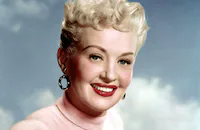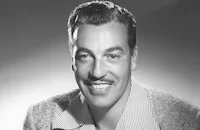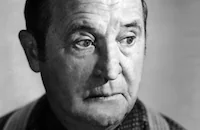Coney Island

Brief Synopsis
Cast & Crew
Walter Lang
Betty Grable
George Montgomery
Cesar Romero
Charles Winninger
Phil Silvers
Film Details
Technical Specs

Synopsis
In 1905, promoter Eddie Johnson goes to Coney Island to find his rival and pal, Joe Rocco, who cheated him out of his share of the carnival they ran together. Eddie is determined to obtain a share in Joe's new saloon, which features singer Kate Farley, but after Eddie denigrates Kate's low-class style, Joe orders him to leave. Eddie then persuades his friend Frankie, who runs a sideshow featuring a tattooed woman, to allow him to turn it into a "Turkish Harem" with dancing girls. Kate, who is mad about Eddie's earlier insults, heckles him, but his idea is a smash and draws away Joe's customers. When Kate informs Joe about Eddie's success, he sends his thugs to destroy the place. In retaliation, Eddie and Frankie instigate a huge fistfight in Joe's saloon, and during the fracas, Joe accidentally knocks out Finnegan, a lovable souse. Eddie and Frankie spirit Finnegan away and give him money to go to Atlantic City for a month, then stage a fake funeral for him. Eddie convinces Joe that he killed Finnegan and threatens to turn him over the police unless he is allowed to make over and run the saloon. Joe reluctantly acquiesces, although Kate is more resistant when Eddie attempts to tone down her garish costumes and frenetic singing. Eddie's methods are successful, and within two weeks, the saloon's business has tripled and Kate is a hit. One afternoon, Finnegan appears in the saloon, and Joe figures out Eddie's ruse, but decides to bide his time to exact revenge. As the weeks pass, Eddie and Kate fall in love, and Eddie makes plans to open his own nightclub. Joe grows jealous of their romance and argues with Eddie, who reveals his plans to leave and take Kate with him. In order to prevent Eddie from getting Kate, Joe is willing to give her up himself, and writes to Broadway impresario William Hammerstein, who comes to hear her sing. Eddie and Frankie conspire to get her out of the saloon that night, however, and when Joe learns that Kate has missed her audition, he tells her that Eddie is only using her. Crushed, Kate accompanies Joe to Hammerstein's theater the next day to sing for him, but reconciles with Eddie when he apologizes. They prepare to marry that afternoon, but Joe again comes between them by hiring an actor to tell Kate that Eddie has secured a bank loan for his club by using her singing services as collateral. Kate is devastated and breaks up with Eddie, despite his pleas of innocence. Later, Hammerstein stages a show starring Kate, and Joe, who acts as her business manager, proposes to her. Kate gently refuses, and when Eddie appears backstage that evening, he tricks Joe into revealing that he broke up their wedding as an astonished Kate listens. Kate returns to the stage, but after the finale, Joe sneaks Eddie into the orchestra to play the piano. Kate realizes that Eddie is there, and the couple smile at each other as she sings a romantic ballad to him.

Director

Walter Lang
Cast

Betty Grable

George Montgomery

Cesar Romero

Charles Winninger

Phil Silvers
Matt Briggs
Paul Hurst

Frank Orth
Hermes Pan
Phyllis Kennedy
Carmen D'antonio
Andrew Tombes
Hal K. Dawson
Buddy Williams
Leo Diamond
Abe Diamond
Dick Hayman
Harry Roller
Pete Maggio
Jimmy Dundee
John Kelly
Jim Toney
John "skins" Miller
Ed Mcnamara
Herbert Ashley
Jimmy Lucas
Francis Sayles
William Halligan
Alphonse Martell
Tom Dugan
Harold Degarro
Dewey Robinson
Libby Taylor
Bud Jamison
Trudy Marshall
Claire James
George Boyce
Harry Masters
Joe Niemeyer
Delos Jewkes
Gene Ramey
Gus Reed
George Gramlich
Alec Craig
Harry Seymour

Byron Foulger
Ruth Gillette
Bert Hanlon
Ruth Clifford
Matt Mchugh
George Lloyd
Crew
Ernest R. Ball
Irving Berlin
Otto Brower
Alfred Bryan
Richard Day
Fanchon
George L. Giefer
William Goetz
George Graff Jr.
Albert Gumble
Otto Harbach
Roger Heman
Karl Hoschna
Frank E. Hughes
Tony Jackson
Henri Jaffa
Gus Kahn
Natalie Kalmus
Thomas Little
Junie Mccree
Alfred Newman
Chauncey Olcott
Ernest Palmer
Hermes Pan
Guy Pearce
William Perlberg
Ralph Rainger
Leo Robin
Helen Rose
George Seaton
Fred Sersen
Robert Simpson
Albert Von Tilzer
Egbert Van Alstyne
E. Clayton Ward
Joseph C. Wright
Saul Wurtzel

Film Details
Technical Specs

Award Nominations
Best Music Original Dramatic Score
Articles
Coney Island (1943)
At the time of the film's release, Grable was approaching the height of her popularity as a WWII pinup and just breaking into the top ten box-office attractions among Hollywood stars. (Before 1943 was over, she would rise to No. 1.) In the movie she plays Kate Farley, an undulating entertainer in turn-of-the-century New York. George Montgomery costars as a Coney Island saloon keeper who brings refinement to her bump-and-grind image, helping her to emerge as a legitimate stage star in the productions of real-life impresario Willie Hammerstein (Matt Briggs). Kate and Eddie fall in love, but complications ensue as she dallies with a rival saloon owner played in typically slick style by Cesar Romero. Between the musical numbers, romantic misunderstandings and other plot shenanigans, Phil Silvers provides comic relief.
Coney Island, directed by Walter Lang, has an unusual credit sequence in which an off-screen chorus sings the words on the opening title card: "Twentieth Century Fox presents Betty Grable, George Montgomery and Cesar Romero in Coney Island." The film had once been planned as a vehicle for Alice Faye, then Ann Rutherford. Grable herself would star in a 1950 remake for Fox entitled Wabash Avenue, with Victor Mature and Phil Harris as her costars.
Some journalists complained that Coney Island was not historically accurate. A reporter for Variety wrote that Grable "winds up at the finish as star of a Willie Hammerstein-produced musical at the Victoria on Broadway. The fact that Willie Hammerstein didn't produce musicals, and that the Victoria was strictly a straight vaudeville theater, evidently escaped the film's scenarist [George Seaton]."
But the movie was a hit with audiences, and most critics were kind. Bosley Crowther wrote in The New York Times that "This one has Betty Grable exercising her vocal chords and limbs to no inconsiderable advantage... It has George Montgomery and Cesar Romero as a couple of rising carnival men constantly crossing each other with their conniving tricks to win her hand. And it has a fair amount of old tunes, as well as several lively new ones, which thump very nicely on the eardrums and background some colorful displays."
1943 was also the year that Grable gave up on her longtime love affair with the married George Raft and entered into her own marriage with bandleader Harry James, which would end in divorce in 1965.
Producer: William Perlberg
Director: Walter Lang
Screenplay: George Seaton
Cinematography: Ernest Palmer
Art Direction: Richard Day, Joseph C. Wright
Music: Cyril J. Mockridge (uncredited)
Film Editing: Robert Simpson
Cast: Betty Grable (Kate Farley), George Montgomery (Eddie Johnson), Cesar Romero (Joe Rocco), Charles Winninger (Finnigan), Phil Silvers (Frankie), Matt Briggs (William 'Willie' Hammerstein), Paul Hurst (Louie), Leo Diamond and His Solidaires.
C-96m.
by Roger Fristoe

Coney Island (1943)
Quotes
Trivia
Betty Grable starred in this as well as its 1950 remake, Wabash Avenue (1950).
Notes
The working title of this film was In Old Coney Island. The words of the opening title cards, "Twentieth Century-Fox presents Betty Grable, George Montgomery Cesar Romero in Coney Island," are sung by an offscreen chorus. During the film's finale, "There's Danger in a Dance," instrumental snippets of "Oh Susanna" and "Let Me Call You Sweetheart" are heard.
Several contemporary news items reported that the film was to be based on books by journalist Edward Van Every, and a screenplay written by Van Every and his collaborator, Dwight Taylor. Information in the Twentieth Century-Fox Records of the Legal Department and the Produced Scripts Collection, located at the UCLA Arts-Special Collections Library, however, reveals that Van Every and Taylor's materials were actually used for another 1943 Betty Grable picture, Sweet Rosie O'Grady. The studio had difficulties obtaining clearances from the heirs of Richard Fox, the publisher of the Police Gazette and the subject of Van Every's works, and in order to prevent another studio from becoming interested in the subject, sent out misleading press releases stating that Van Every was working on Coney Island.
The scripts collection also contains drafts for Coney Island written by Nat Ferber, John Wexley and Sam Hellman, but the extent of their contribution to the completed film has not been determined. According to a May 22, 1941 Hollywood Reporter news item, writer George Seaton, who is credited onscreen with the film's screenplay, was going to New York to gather research materials and interview the surviving family members of George C. Tilyou, who built Steeplechase Park at Coney Island in 1897. The news item states that "the entire picture is to be played from the standpoint of the Tilyous." Hollywood Reporter news items from 1941 announced that Laird Cregar, Alice Faye and Pat O'Brien would star in the film. In April 1942, a Hollywood Reporter news item noted that Irving Cummings had been set to direct the picture, with star Ann Rutherford. Lynn Bari was set for the "second" female lead, according to a September 1942 Hollywood Reporter news item. Although an October 1942 Hollywood Reporter news item stated that "Old Demon Rum," a song by Leo Robin and Ralph Rainger, would be sung in the picture, it does not appear in the final film. November 1942 Hollywood Reporter news items noted that second unit director Otto Brower directed some sequences at the Venice Pier, near Los Angeles.
Although the picture received mostly positive reviews, several critics complained about its lack of historical accuracy, including the Variety critic, who stated: "[Grable] winds up at the finish as star of a Willie Hammerstein-produced musical at the Victoria on Broadway. Fact that Willie Hammerstein didn't produce musicals, and that the Victoria was strictly a straight vaudeville theatre, evidently escaped this film's scenarist." Coney Island received an Academy Award nomination for Best Scoring of a Musical Picture. Lux Radio Theatre broadcast two presentations of the story. The first, on April 17, 1944, starred Dorothy Lamour and Alan Ladd, and the second, which starred Grable and Victor Mature, aired on September 30, 1946. In 1950, Grable and Mature starred in Twentieth Century-Fox's remake of the picture, Wabash Avenue (see below).














